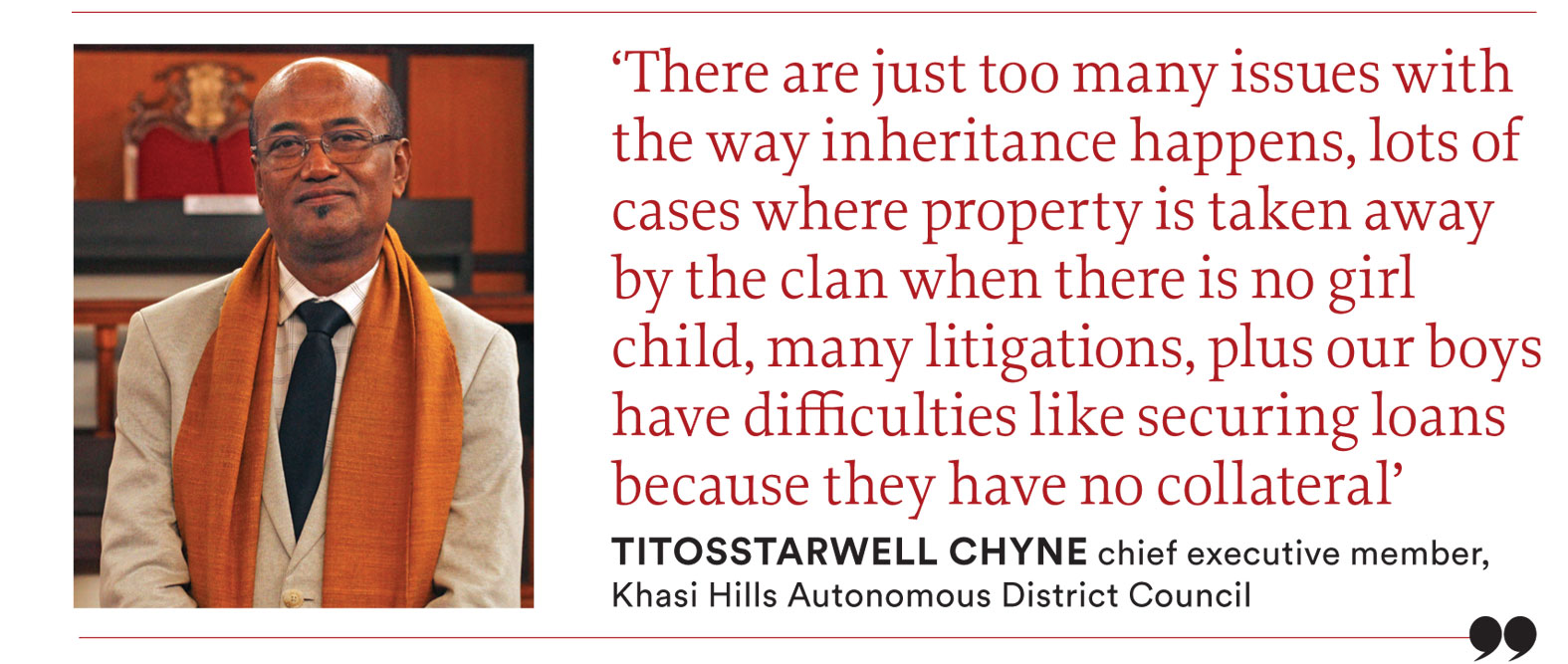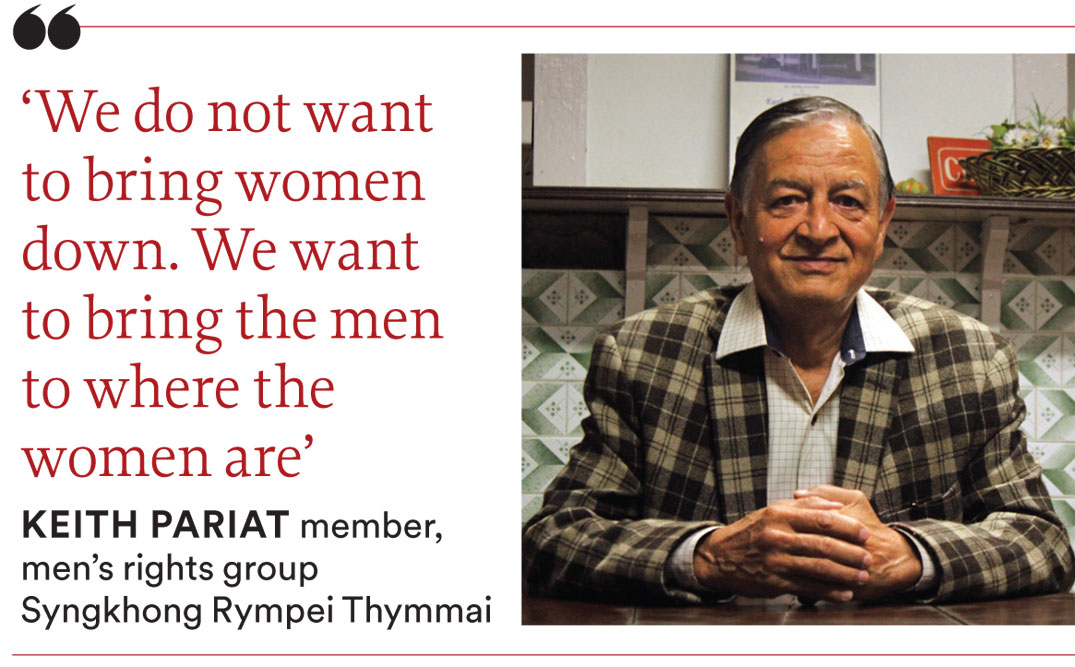The Loss of Inheritance
One of the world’s last matrilineal systems is changing in Meghalaya but no one is sure if that is a good thing
 Lhendup G Bhutia
Lhendup G Bhutia
 Lhendup G Bhutia
Lhendup G Bhutia
 |
19 Nov, 2021
|
19 Nov, 2021
/wp-content/uploads/2021/11/Meghalaya1.jpg)
A Khasi woman and her children in Mawlynnong village in Meghalaya (Photo: Getty Images)
Decades ago, long before Meghalaya was carved out of Assam, something unthinkable happened in Keith Pariat’s family. Even though they belong to the matrilineal Khasi society, Pariat’s father got all his children to carry his last name. This was because, as Keith explains, his father believed Khasi society was suffering from many social ills and could overcome those only by converting itself into a patrilineal society. Despite the opprobrium that came his way, this tradition has carried on within the Pariat family across generations, with most of the males bestowing their last names on their children. “My father was a bit of an outlier,” Keith says. “We are all Pariats now. But nobody thinks we are pakka [genuine] Pariats.”
Although they still constitute a tiny fraction of Khasi society, just like the Pariats, several Khasi individuals are adopting patrilineal and sometimes even patriarchal practices within their families. Children take up their father’s last names, properties are divided among both male and female children, and in some cases, husbands aren’t moving into their wives’ homes but setting up their own.
Seated in his home in Shillong, Pariat says, “The matrilineal system might have had its uses. But it is an antiquated system and it is not feasible anymore.”
Last week, the Khasi Hills Autonomous District Council (KHADC), which covers the three districts of West and East Khasi Hills, and Ri Bhoi where a majority of the Khasi population lives, introduced a Bill that, if it became law, would change a crucial aspect of the Khasi matrilineal system—the way property is inherited.
Instead of the traditional practice, where the youngest girl inherits property, this new Bill allows parents to leave behind a will by which property can be divided equally between male and female children. “It is something that is needed badly,” says Titosstarwell Chyne, the chief executive member of KHADC. “There are just too many issues with the way inheritance happens, lots of cases where property is taken away by the clan when there is no girl child, many litigations, plus our boys have difficulties like securing loans because they have no collateral [in the form of property to show]. The whole process of inheritance needs to be streamlined.”
This process of streamlining—whether it is a new law that modifies an age-old practice of matrilineal inheritance or the way some individuals introduce changes within their own families—is quickly transforming, some fear, one of the last few matrilineal societies in the world.
Although it is a much-debated subject, some anthropologists argue that the matrilineal system predates patrilineality. That ancient humans’ earliest domestic institution was not the family, but a matrilineal clan. The Khasis, who number an estimated 14.1 lakh, comprising nearly half of Meghalaya’s population, are believed to have adopted such a system because in ancient times their men raided the plains and waged wars with other tribes and were away for long stretches of time. Left without their fathers, children tracing their lineage from their mothers made good sense.
Traditionally, Khasi men move into their wives’ homes, children carry the mother’s last name, and inheritance is passed down to the daughter. Instead of the father, it is the maternal uncle (or kni), whether married or not, who plays a crucial role, acting as the children’s guide.
But Khasis’ matrilineal structure appears to be undergoing a transformation. The society is no longer as insulated as it once was. Increasing education and urbanisation means more people from the community are travelling to places such as Shillong where both matrilineal and patrilineal communities live close to each other, or places outside the state where only patriarchal setups exist. The clans’ powers are diminishing, families are turning nuclear, and even the strong patriarchal orientation of Christianity, while it has never directly interfered in the practice of matrilineality, has played a part in the consolidation of the authority of the father who is gradually taking over the role so far of the maternal uncle. “Meghalaya seems to be at a crossroads with the introduction of the Khasi Inheritance Bill and is poised for upheavals in its social fabric,” says Professor Amena Passah, a historian at the North-Eastern Hill University in Shillong. “From the colonial period, education and urbanisation, leading to occupational mobility had resulted in the declining authority of the kni. Today, the fathers play a more decisive role.”

While the Bill seeks to give parents the power to choose their inheritors and provide for an equitable distribution of property among men and women, it still carries certain traditional characteristics. In the case of self-acquired property earned by the parents in their lifetime, the couple will be able to prepare a will and divide it equally among both their male and female children. But for property passed down from their ancestors, parents will only be able to make a will in the presence of the maternal uncle. Irrespective of whether a will is prepared or not, Chyne explains, the house, as dictated by tradition, will still go to the youngest daughter. However, the Bill introduces the condition that the youngest daughter will inherit the house so long as she performs the traditional role of taking care of her parents. “The wishes of parents were suppressed in the past. They were forced to part with all their property in favour of the youngest daughter,” Chyne says.
Passah points out that economic factors more than any other cause lie at the root of this debate about the need to modify inheritance laws. “Today, fathers play a more decisive role, but many bemoan the difficulty of applying for loans since they do not have collateral to bank on. Also, their parents’ property [is seen] as misused by non-Khasi brothers-in-law,” she says.
The resulting opprobrium at the news of modifying traditional rules has now led to the Bill being sent to a select committee. Chyne says the committee will consult Khasi civil society and seek opinion from legal experts on whether the Bill can be passed, before reintroducing the Bill in KHADC.
Comparing the inheritance practices of the matrilineal Khasi society to patrilineal societies, for instance in India, throws up an interesting question. If the legal system supports the division of property among male and female children in patrilineal societies, where all property in earlier times went to the male child, can’t such parity be introduced among Khasis?
In many cases, especially in urban areas like Shillong, many parents already divide self-acquired property among both male and female children. Others continue with the traditional system because they find it easier, says Iamon M Syiem, the former head of the sociology department at St Edmund’s College in Shillong and the current chairperson of the Meghalaya State Commission for the Protection of Child Rights. “[The] reality is that not all families have property. So [the Bill] would essentially apply only to those who have property. The transition [through the Bill] in the case of self-acquired property would be relatively easier,” she says. “I am all for a fair and equitable distribution of parental and self-acquired property. In the case of the ancestral home, parents/mother should be given that legal option to make a will in consensus with immediate siblings as the case may be. This may also prevent neglect and possible cruelty by ‘traditional custodians’ of property as has happened in some cases.”
“However if the mother still has siblings [maternal uncles to her children], the decision is not hers alone. Otherwise, there will be conflict. There are many factors to consider,” she says. “There are these complexities that weave themselves into tradition, culture and identity. But I do believe this deliberate intent to bring about economic fairness is needed and the desire is not new because it applies to patriarchal societies as well.”
“We do not want to bring women down,” Keith says. “We want to bring the men to where the women are.” Pariat belongs to a Khasi men’s rights group called Syngkhong Rympei Thymmai (SRT), which means “a new hearth”, that has since 1990 been campaigning to convert Khasis’ matrilineal structure to patrilineal.
It is a peculiar group, one which traces its ancestry to another group in the 1960s, called Iktiar Longbriew Manbriew (“the authority to live a proper life”) which had arrived at the conclusion that Khasi men were lagging behind others sociologically and economically because of the practice of matrilineal succession. The earlier group would often come under attack, sometimes with protestors chasing them with knives. Today SRT, whose membership has swelled to about 5,000, are tolerated reluctantly.
According to Pariat, alcoholism, drugs consumption and early deaths as a result of these, and instances of men abandoning their wives are common among Khasi men, because centuries of living with a reduced status has made them irresponsible. SRT also claims that many Khasi women now marry non-Khasis because men from patriarchal setups are much better placed.
Their ideas, however, bring them inconvenience. People with their father’s last name find it difficult to get Scheduled Tribe certificates, men who insist their children will carry their last names often find themselves without partners, and there is a constant pressure to drop their father’s or husband’s last names.
A few years ago, I met a Khasi man named Tensing Paul Syiem, whose parents had moved to Digboi in Assam where they had come to adopt patrilineal practices. After Tensing moved to Cherrapunjee with a job and fell in love with a Khasi woman, he had to get married under police protection because he insisted she move into his house and their children carry his last name. Pariat himself had to get his daughter to drop his last name and take his wife’s because the failure to do so would have denied her the scholarship she had won from the state’s governor. “It would have been unfair to impose myself on her,” he says. “But with my son, although he will face difficulties, I have kept his surname Pariat.”

Although the group has pushed for equitable distribution of property between male and female children, it fears the detrimental impact the Bill might have on men if it becomes law without preparing the society for it. “Imagine a guy who has never had any property, someone who is hooked to drugs, imagine if he gets all this [property] suddenly. What will he do?” he asks.
At the heart of many of these issues lies the fear of Khasi women marrying outside the community, and because property is traditionally inherited by women, of outsiders getting access to Khasi lands and property.
Even in the Bill seeking to modify inheritance practices, one clause stipulates that Khasi women will be stripped of their inheritance rights if they adopt their non-Tribal husbands’ customs and traditions. Children of such mixed marriages will also lose their inheritance rights if they follow their fathers’ customs. “We have women living abroad, who have adopted their husbands’ customs, but who still own their families’ property instead of their brothers living here,” Chyne says. “Why shouldn’t that change?” Pariat also points to the many individuals who, he believes, have moved to Meghalaya, married Khasi women, got access to their property and benefited from provisions for Khasi Tribals, such as tax concessions.
This is also not the first time that Khasi women who have married outside the community (and children of such mixed marriages) have been sought to be disempowered. Before the current Bill, the Village Administration Bill of 2014 and a 2018 amendment to the Khasi Lineage Bill had similar clauses, seeking to disinherit women or disqualify them as Khasis (and the benefits that come with such a recognition) when they marry non-Tribals. “I really wonder if this is not the primary objective, where they attach this clause to any and everything,” says Joy Grace Syiem, who heads the Meghalaya chapter of women’s rights group North East Network.
Many women’s rights groups point out that Khasis are a patriarchal society in disguise with women wielding little actual power. Joy points to the lack of women in positions of power, both in politics and government institutions to corroborate her point. The youngest daughter is made a custodian, she points out, and not the owner of the property, and every decision of hers about selling or purchasing property has to be taken after consulting her maternal uncle.
“The equitable distribution of property could be a good thing, provided the duty of caring for the parents is also divided. But the Bill stops at only distributing the property,” she says.
Joy understands that the Khasi matrilineal society is undergoing change. She talks about the declining power of the clan, how the maternal uncle’s position is eroding over time and the father coming to assume a more important role. After over a decade spent pursuing her education and career in Mumbai and then abroad, she returned to Shillong because she is the youngest daughter. After her and her sister’s marriages, their spouses moved into their homes, while their brother moved to his wife’s. “I never thought I would come back. But I did,” she says.
Iamon Syiem believes change is inevitable. “Whether we like it or not, everyday practices by everyday people will bring about erosion of some sort in our traditions,” she says. “[But] as a wise colleague [musician Bah Chesterfield Khongwir] once said, ‘If you need new shoes, buy them. But if your slippers are still functional don’t throw them away’.”

/wp-content/uploads/2025/07/Cover-Shubman-Gill-1.jpg)










More Columns
Shubhanshu Shukla Return Date Set For July 14 Open
Rhythm Streets Aditya Mani Jha
Mumbai’s Glazed Memories Shaikh Ayaz